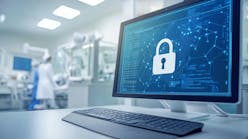Ultrasound-guided regional anesthesia
Konica Minolta Healthcare Americas, Inc.
Light cord inspection
Light Cord Adapters, added to Healthmark Industries’ ProSys Instrument Care product line, help connect light cords to a light source for inspection. The adapters assist healthcare workers with testing the integrity of light cords for intensity of light and fiber optic damage. A user chooses the appropriate light cord adapter, attaches a light source to the adapter and secures together, and then activates the light source and inspects. If any defects or damage are identified, they can remove the light cord from service. The adapters are offered for the following makes of light cords: Storz, Stryker, ACMI and Wolf, and are available for individual purchase. Available light sources are sold separately.
Noise-cancelling X-ray imaging
Smart Noise Cancellation (SNC) artificial intelligence (AI)-based technology by Carestream Health, isolates noise to produce images that are significantly clearer than with standard processing. SNC has received FDA 510(k) Clearance and is available as an optional feature with Carestream’s ImageView Software, powered by Eclipse image-processing and used on DRX-Evolution and DRX-Evolution Plus systems. When combined with SmartGrid software, SNC software generates gridless imaging where the removal of scatter typically leads to an increase in noise appearance. Objective testing demonstrated that SNC processing enables a two-time to four-time noise reduction in flat image areas, preserves high frequency sharpness and improves contrast detail.
Cardiac cath lab lower-radiation imaging
The $3 million cardiac catherization laboratory at the Sandra Atlas Bass Heart Hospital (SABHH) at North Shore University Hospital is equipped with the latest ARTIS icono technology from Siemens Healthineers. ARTIS reduces radiation doses with high-definition imaging to provide more precise placements of stents to lower potential complications in complex cases. The technology automatically selects the lowest radiation dose for the patient based on the cardiologist’s preferred image quality during a cardiac interventional procedure. Interventional cardiologists at the SABHH perform approximately 2,700 percutaneous coronary intervention procedures annually.









